Poignant performance in Whitehaven
A pit tragedy means that this particular performance of Hamlet in Whitehaven is turned into a benefits night in order to raise money for the families of those miners who have most recently lost their lives. This British Library playbill from the time shows the pain in the community following the 'late melancholy catastrophe' at a local pit, Duke Pit.
-
![]()
Much ado near me
Hear more Shakespeare stories on BBC Radio Cumbria
-
![]()
Shakespeare Festival 2016
The BBC celebrates the genius of the bard
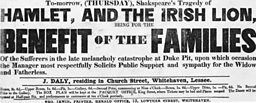
"For in that sleep of death what dreams may come,
When we have shuffled off this mortal coil,
Must give us pause."
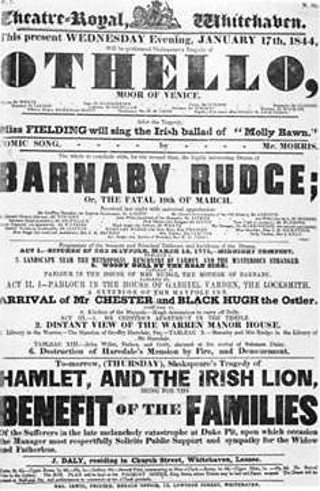
For a small mining community like Whitehaven... this was a devastating incident
-Hamlet, Act III, Scene 1
Although this play bill - dated January 17th 1844 - advertises a performance of Othello, it is a sober note further down the page that catches the eye.
There has been a mining disaster at Duke’s Pit in Whitehaven and a benefit production of Hamlet is being staged alongside another entertainment called The Irish Lion.
All the money raised will go the families of those left widowed and orphaned by the tragedy.
Sadly such disasters were not unknown to the community as coal mining was its lifeblood.
This particular reference is to an incident in Duke Pit on Thursday afternoon, between 3 and 4 o'clock where 11 local men were killed.
The Whitehaven Herald on 13th Jan 1844 had more on the desperate attempt to rescue the men in its report about the tragedy:
"It was heard at the mouth of the pit, and three men were lowered down to ascertain the nature of the accident. The hooker, James Holmes, the stableman, and William McAvery, the last man of the day shift, were found lying at the bottom of the shaft insensible: they were hauled up and revived soon afterwards; none of them sustained any dangerous injury.
A dog, which was taken down by one of the men who were sent to explore the pit, after running several yards, dropped down dead. On examining the working it was found that the explosion had been most fatal: the whole of the eleven men who were commencing their night work were found lifeless; and eleven horses used in the pit were also found dead.
One by one the men were raised to the pit mouth, after being identified, conveyed to their horror-stricken and sorrowful relatives."
For a small mining community like Whitehaven where several generations of the same family could work in the mines, this was a devastating incident. Crowds lined the road leading to the pit and there were heart-rending scenes as the cart carried the bodies of the dead away from the mine.
An Elegy was written on the evening of the calamity which appeared at the Duke Pit – here is one of the verses:
"Methinks I hear the carts go rumbling on.
Containing this, — a father, that-his son,
And now I see a youth, before the fire,
Outstretched lies beside his frigid sire;
While all the latent ties of flesh and blood
Breathe sighs to nature, and Heave groans to God.
Another cart! — how murmuring the sound
Which passes slowly o'er the ill paved ground
Containing — Who?" th' impatient kindred cry,
"Brothers! Two brothers!" is the sad reply."
The Duke Pit fan house in Whitehaven
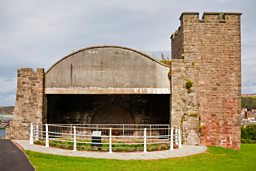
There’s a postscript to this story.
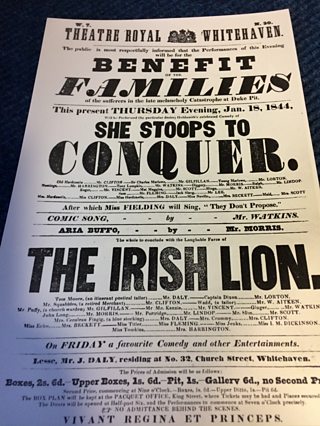
It seems that the benefit performance of Hamlet did not go ahead as planned. She Stoops to Conquer, a comedy by Oliver Goldsmith was performed instead.
Our playbill experts from the British Library have some suggestions as to why this substitution could have occurred. They say that last minute changes to a bill were not unusual as professional theatre companies had a range of plays they could perform pretty much on demand. It looks like the programme could have been changed in the couple of days between printing the playbill and the performance itself.
The cast may have felt they were better prepared for She Stoops To Conquer, or have thought that this play would attract a bigger audience and make more money to help the stricken families. A popular comedy may also have lightened the mood of a town in mourning.
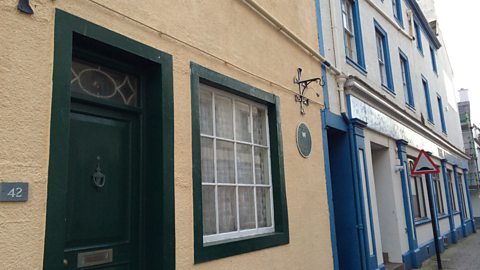
Hear a retelling of the tragedy at the Duke Pit narrated by the Whitehaven Theatre Group
Based on newspaper cuttings and documents from the Whitehaven Archive Centre
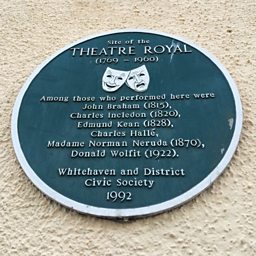
About Shakespeare on Tour
From the moment they were written through to the present day, Shakespeare’s plays have continued to enthral and inspire audiences. They’ve been performed in venues big and small – including inns, private houses and emerging provincial theatres.

BBC English Regions is building a digital picture which tracks some of the many iconic moments across the country as we follow the ‘explosion’ in the performance of The Bard’s plays, from his own lifetime to recent times.
Drawing on fascinating new research from Records of Early English Drama (REED), plus the British Library's extensive collection of playbills, as well as expertise from De Montfort University and the Arts and Humanities Research Council, Shakespeare on Tour is a unique timeline of iconic moments of those performances, starting with his own troupe of actors, to highlights from more recent times. Listen out for stories on Shakespeare’s legacy on your BBC Local Radio station from Monday 21 March, 2016.
You never know - you might find evidence of Shakespeare’s footsteps close to home…
Craig Henderson, BBC English Regions
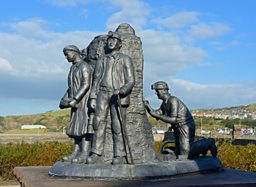
-
![]()
Shakespeare Lives
The nation’s greatest performing arts institutions mark 400 years since the Bard's death
Related Links
Shakespeare on Tour: Around Cumbria
-
![]()
The King's Men generously welcomed to Cumbria
King James I also spends time in Cumbria
-
![]()
Theatre manager relies on The Merchant of Venice to avert a cash crisis
Plus, Dr Johnson praising the 'Immortal Shakespeare'
Shakespeare on Tour: Around the country
-
![]()
A horse! A horse! My kingdom for a horse!
King Richard III's horse White Surrey is the star of the show
-
![]()
Modern day Macbeth for Corby steel town
The adaptation encouraged younger viewers to connect to Shakespeare
-
![]()
Sarah Siddons plays Hamlet in Liverpool
Actress becomes first woman known to have played Shakespeare's Prince of Denmark
-
![]()
Child prodigy actor prepares to retire as he headlines in Newcastle
W.R. Grossmith says farewell to the stage at 11









